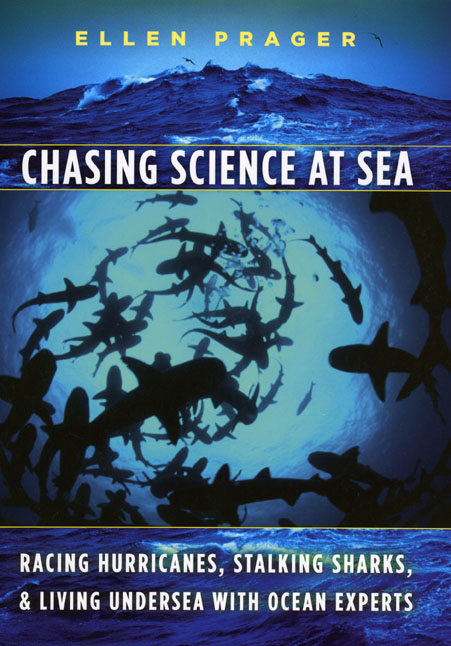Revealing the watery world of ocean scientists

Last Saturday’s Wall Street Journal contains an enthusiastic review of Ellen Prager’s new book Chasing Science at Sea: Racing Hurricanes, Stalking Sharks, and Living Undersea with Ocean Experts. Writing for the WSJ Michael J. Ybarra begins his review:
Ellen Prager would seem to have an enviable job: traveling the world to unravel the mysteries of the deep. “For the uninitiated, spending days doing research while cruising aboard a ship or living on a remote tropical island sounds glamorous, a vacation of sorts,” she writes in Chasing Science at Sea. “Glamour rarely comes into it.”
Ms. Prager, the chief scientist at Aquarius Reef Base in the Florida Keys, the world’s only undersea research station, uses breezy, accessible prose to evoke the beauty and magic of the underwater world—as well as the banalities of working as a scientist in an alien environment. She describes collecting fish poop, writing grant proposals (the competition among ocean scientists for money “is fierce”), and battling seasickness and skin rash from prolonged immersion. And Ms. Prager decries the alarming changes she perceives in the world’s oceans, including dying coral reefs, decimated fish stocks and the spread of algae blooms that “can kill fish and render the sea unlivable.” The reasons for such aquatic degradation, she says, include pollution, over-fishing and global warming.
But Chasing Science at Sea is hardly dominated by eco-lamentation; Ms. Prager is too intoxicated with her job for that. “I’ve encountered equipment-stealing sea lions in the Galápagos, worked with ex-NFL football players turned underwater shark-wrestling stuntmen, nearly capsized on a trawler while entering a dangerous inlet, faced a hurricane at sea with a boat full of undergraduates, and stood waist-deep in steaming mud as turkey vultures circled overhead.”
Read the rest of the review on the Wall Street Journal website.
Also read an excerpt from the book.